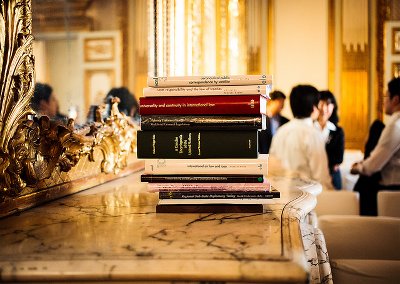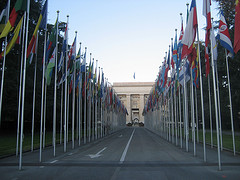Arab governments are as derelict in following international standards on free expression as they are in upholding relevant articles in constitutions of their own. Despite issuing numerous official statements promising to protect and respect freedom of expression and related civil and political rights, “All of the countries in the Arab world are in serious breach of all or most of these standards,” writes Toby Mendel, executive director of the Centre for Law and Democracy in the 2013 Handbook on International Standards and Media Law in the Arab World.
Such standards include not only Article 19 in the nonbinding Universal Declaration of Human Rights (UDHR) but also Article 19 of the International Covenant on Civil and Political Rights (ICCPR), a legally binding treaty that 15 Arab nations have ratified and that sets the international standards for democratic rights. In addition, Arab countries have affirmed their public support for free expression in the Sana’a Declaration of 1996, the ArabCharter on Human Rights of 2004/08, and even more recently at the League of Arab States (LAS) summit in Doha, where delegates declared:[ref]The Arab League and Human Rights: Challenges Ahead, FIDH, 2013. p. 18.[/ref]
We reiterate our commitment to basic principles and humanitarian values and human rights in all forms, and our commitment to the principles and provisions of the Arab Charter and other treaties and conventions our States have ratified, and our respect for freedom of expression, thought, independence of the judiciary, the enhancement of popular participation and encouraging the role of civil associations and civil society organizations, and we call for a conference with civil society in Doha in order to examine the development of human rights mechanisms in the LAS.
Of course, as we wrote last week, in articles of the constitutions as in statements like these, the caveat “within the limits of the law” is always implied, whether or not it actually appears in the texts, rendering these international pronouncements as irrelevant as their constitutional counterparts with regard to the protection of rights.
Article 19, Paragraph 3
Although not all Arab countries have signed and ratified the ICCPR, understanding the covenant’s Article 19, and in particular the limits of the limits outlined in Paragraph 3, is essential to further discussion of international standards of free expression. This article, because it is legally binding on ratifying countries and because it outlines limits on free speech, makes a better baseline than the more aspirational Article 19 in the UDHR. It also reinforces the dual nature of free expression that comprises both the right to free speech and the right to receive information.[ref]Mendel, p. 6.[/ref] Article 19 of the ICCPR states:
- Everyone shall have the right to freedom of opinion.
- Everyone shall have the right to freedom of expression; this right shall include freedom to seek, receive and impart information and ideas of all kinds, regardless of frontiers, either orally, in writing or in print, in the form of art or through any other media of his choice.
- The exercise of the rights provided for in paragraph 2 of this article carries with it special duties and responsibilities. It may therefore be subject to certain restrictions, but these shall only be such as are provided by law and are necessary:
- For respect of the rights and reputations of others;
- For the protection of national security or of public order (ordre public), or of public health or morals.
The first two paragraphs affirm the right to expression, while Paragraph 3 outlines the circumstances in which it may be permissible to restrict speech. The UN Human Rights Council and other regional human rights bodies have further specified the narrow set of conditions under which restrictions on expression, offline and online, may be permissible. These conditions comprise a three-part test:
- Any restrictions on expression must be proscribed by law or in conformity with the law. For this condition to be met, the law must be clear and accessible.
- Restriction on expression can only be justified if:
- the restriction meets one of the two legitimate aims (for respect of the rights and reputations of others or the protection of national security, etc.) and
- the restrictive measure is “primarily directed at that aim,” and
- It must be necessary to restrict expression to achieve the aim in question. Three further conditions qualify this last point:
- As in point 2, there must be a direct, rational connection between restricting speech and achieving the aim, and the restrictions must not be arbitrary or unfair
- Rights must be limited as little as possible. That is, a restriction should only have its intended effect in the specific situation for which it applies, and
- Limits must be proportionate. That is, limits on expression must take into account the likely impact they will have and be curbed accordingly.
Not Necessary or Proportionate
In practice, Arab legal systems ignore this interpretation of Paragraph 3, applying it broadly and arbitrarily to create the loopholes they need to limit free expression on an as-needed basis. For example, censorship is often justified on the grounds of protecting public morals. Statutes against defamation encompass not only libel and slander but also blasphemy and lesser insults, particularly those directed at the State and its institutions. And in anti-terrorism and anti-cybercrime legislation, expression is often curtailed expansively in the name of national security.
Laws governing expression, explains Jordanian media law expert Mohammed Qutaishat, are “premised on ambiguity and on hiding a number of issues through legal language that is very vague and can be explained differently,”[ref]Conversation with Mohammed Qutaishat, Doha, Qatar, January 27, 2014.[/ref] depending on the whims of the authorities. Such word play constitutes a clear violation of the principle of clarity and accessibility, which “gives the authorities the discretion to apply them in situations which bear no relation to the original purpose of the law or to the legitimate aim sought to be protected.”[ref]Mendel, p. 7.[/ref] Even terms to describe the media themselves are often vague. Recent amendments to Jordan’s constitution, for instance, refer vaguely to “electronic publications” leaving a wide berth for interpretation and abuse.

In proportion, unlike Arab regimes’ limitations on free speech. National Galleries, Edinburgh_remix_MMIX by D. Sinclair Terrasidius. CC BY 2.0. https://flic.kr/p/78z4fE
Under the guise of protecting the “rights and reputations of others,” highly subjective phrases such as “social principles or values,” “insulting the king,” “harming foreign relations,” “immoral content,”or “in contempt of religion” appear in penal codes and press and publications laws as catch-alls for speech that attempts to express any kind of dissent or criticism, violating the principle of proportionality, which according to the UN Human Rights Committee,
must also take into account of the form of expression at issue as well as the means of its dissemination. For instance, the value placed by the Covenant upon uninhibited expression is particularly high in the circumstances of public debate in a democratic society concerning figures in the public and political domain.[ref]Mendel, p. 8.[/ref]
Flouting this principle entirely, even the verified truth of a criticism is in many countries not a legitimate defense of its expression by a journalist or ordinary citizen.[ref]Duffy, Matt. Media laws and regulations of the GCC countries. Doha Centre for Media Freedom, 2013. p. 13.[/ref]
As a result, Arab legislation not only ignores but categorically rejects the European Court of Human Rights understanding that “the notion of protecting unpopular speech lies at the very heart of the importance of guarantees of freedom of expression,” even if that speech is intended to “offend, shock, or disturb the State or any other sector of the population.”[ref]Mendel, p. 4.[/ref]
Just how Arab states, or any state for that matter, continue to get away with repeatedly saying one thing and doing the opposite on the international stage is a discussion with too many threads to trace here. But because restricting free expression is also a means of restricting all other rights, it is increasingly evident that realizing reform will require more than intrepid activists, civil society organizations, and sympathetic businesspeople working from the inside. It will mean that states who demand and enforce free expression and press freedom within their own borders must make adhering to international law a condition of doing business with states that don’t. Then, we might have a chance for reform.
Check back next week for a look at the relationship between regional institutions and free expression online, including recent moves toward establishing an Arab Human Rights Court.



